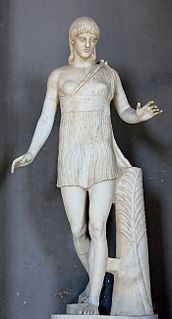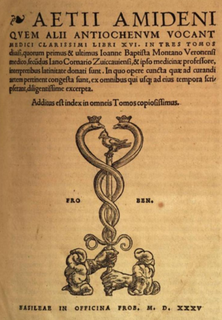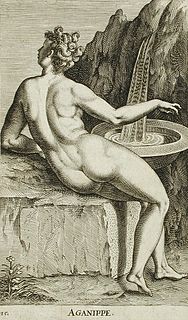Related Research Articles
Lucius Accius, or Lucius Attius, was a Roman tragic poet and literary scholar. Accius was born in 170 BC at Pisaurum, a town founded in the Ager Gallicus in 184 BC. He was the son of a freedman and a freedwoman, probably from Rome.

Pasiteles was a Neo-Attic school sculptor from Ancient Rome at the time of Julius Caesar. Pasiteles is said by Pliny to have been a native of Magna Graecia, and to have been granted Roman citizenship. He worked during a period where there was a demand for copies of, or variations on, noted works of Greek sculpture; the demand was met by the workshops of Pasiteles and his pupils Stephanus and Menelaus and others, several of whose statues are extant. According to Pliny, Pasiteles made an ivory statue of Jupiter for the temple of Metellus and made statues for the temple of Juno in the portico of Octavia.

Aëtius of Amida was a Byzantine Greek physician and medical writer, particularly distinguished by the extent of his erudition. His birth and death years are not known, but his writings appear to date from the end of the 5th century or the beginning of the 6th.

Acron, son of Xenon, was a Greek physician born at Agrigentum.
Agamede was a name attributed to two separate women in classical Greek mythology and legendary history.
Quintus Fabius Maximus Gurges was Roman consul in 265 BC, and died of wounds received in battle at Volsinii, where he had been sent to help put down a revolt. There is some uncertainty as to his identity.
Aegimus or Aegimius was one of the most ancient of the Greek physicians, who is said by Galen to have been the first person who wrote a treatise on the pulse. He was a native of Velia in Lucania, and is supposed to have lived before the time of Hippocrates, that is, in the 5th century BC. His work was entitled Περί Παλμων, which is no longer extant.
Aeschines was a Greek ancient physician who lived in the latter half of the 4th century AD. He was born on the island of Chios, and settled at Athens, where he appears to have practiced with little success, but acquired fame by a cure of Eunapius Sardianus, who on his voyage to Athens had been seized with a fever, which yielded only to treatment of a peculiar nature.
Agriopas was a writer of ancient Greece mentioned by Pliny the Elder. He was the author of an account of the Olympic victors, called the Olympionicae. His exact date of birth is unknown.
The name Alcon or Alco can refer to a number of people from classical history:
Aleuas or Alevas can refer to more than one person from ancient Greek myth and history:
Cameria or Camerium was an ancient city of Latium, which according to tradition was conquered by Rome in the time of the Kings, and destroyed following a revolt against Roman authority in 502 BC. Its inhabitants were known as Camerini.
Hicesius was a Greek physician, who lived probably at the end of the 1st century BC, as he is quoted by Crito, and lived shortly before Strabo. He was a follower of Erasistratus, and was at the head of a celebrated medical school established at Smyrna. He is several times quoted by Athenaeus, who says that he was a friend of the physician Menodorus; and also by Pliny, who calls him "a physician of no small authority." There are extant two coins struck in his honour by the people of Smyrna.
ServiliusDamocrates was a Greek physician at Rome in the middle to late 1st century AD. He may have received the praenomen "Servillius" from his having become a client of the Servilia gens. Galen calls him ἄριστος ἰατρός, and Pliny says he was "e primis medentium," and relates his cure of Considia, the daughter of Marcus Servilius. He wrote quite a few pharmaceutical works in Greek iambic verse, of which there only remain the titles and some extracts preserved by Galen.
The gens Albucia or Albutia was a minor plebeian family at Ancient Rome family, known from the late second century BC to the first century AD. This gens may have been of Ligurian or Gallic origin, as one of the best-known individuals of this name was a native of the town of Novaria in Cisalpine Gaul.
The gens Arellia was a plebeian family at Rome. Although of equestrian rank, this gens does not appear to have been particularly large or important, and is known primarily from three individuals.
Sextus Julius Caesar was a Roman statesman, who held the consulship in 91 BC. He died during the Social War. He was the uncle of Gaius Julius Caesar, the dictator.
The gens Messia was a plebeian family at Rome. The first person of this name to appear in history is Vettius Messius, a Volscian soldier whose courage inspired his comrades in a desperate battle against the Romans in 431 BC. It is not known when the Messii first obtained Roman citizenship. Members of the family appear in the lists of annual magistrates during the final decades of the Republic. In imperial times, some of the Messii achieved the highest offices of the Roman state.

In Greek mythology, Aganippe was the name of both a spring and the Naiad associated with it. The spring is in Boeotia, near Thespiae, at the base of Mount Helicon, and was associated with the Muses who were sometimes called Aganippides. Drinking from her well, it was considered to be a source of poetic inspiration. The nymph is called a daughter of the river-god Permessus. Ovid associates Aganippe with Hippocrene.
Archagathus, a Peloponnesian, the son of Lysanias, who settled at Rome as a practitioner of medicine around 219 BCE, and, according to Lucius Cassius Hemina, was the first person who made it a distinct profession in that city. He was received in the first instance with great respect, he was accorded the Jus Quiritium -- that is, the privileges of a free native of Rome -- and a shop was bought for him at the public expense; but his practice was observed to be so severe, that he soon excited the dislike of the people at large and produced a complete disgust to the profession generally. In return for the favors he received from the Romans, he purged, bled, hacked, and cauterized them to such a degree, that at length they refused to tolerate such rough treatment any longer, and the commonwealth was purged of Archagathus himself.
References
- ↑ Pliny the Elder, Naturalis Historia xxix. 5)
- ↑ Greenhill, William Alexander (1867), "Albucius", in Smith, William (ed.), Dictionary of Greek and Roman Biography and Mythology , vol. 1, Boston: Little, Brown and Company, p. 94, archived from the original on 2008-05-01, retrieved 2008-06-17
![]() This article incorporates text from a publication now in the public domain : Smith, William, ed. (1870). "Albucius". Dictionary of Greek and Roman Biography and Mythology .
This article incorporates text from a publication now in the public domain : Smith, William, ed. (1870). "Albucius". Dictionary of Greek and Roman Biography and Mythology .